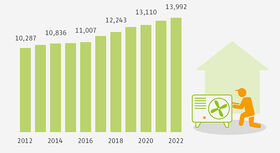Profile of an occupation – plant mechanic for sanitary, heating and air conditioning systems
The transition to sustainable heating energy proclaimed by policy makers is putting wind into the sails of an occupation which has long since had a “rock bottom” reputation among young people. The chance to become involved with a diverse range of modern technologies is making the training occupation of plant mechanic for sanitary, heating and air conditioning systems more and more popular and is helping bring about an image shift. This article describes the state-of-the-art and energy-efficient systems being used in technical building equipment plants and also looks at the development in trainee numbers.

Water, heat and air
The demand for heat pumps and good employment opportunities are providing a real boost for the sanitary, heating and air conditioning sector and are starting to lead to change. All eyes are on one training occupation in particular. Plant mechanics for sanitary, heating and air conditioning systems deal with all aspects of the use of water, heat and air in buildings. Highly sophisticated technologies are increasingly being deployed. State-of-the-art and complex systems, especially heat pumps and condensing boiler technology, require specialised expert knowledge.
However, plant mechanics for sanitary, heating and air conditioning systems also build water and air supply systems and construct and connect up shower cubicles, toilets and other sanitary facilities. They install sustainable treatment and disposal systems, including equipment for the use of rainwater and process water. Hygiene measures are also of considerable significance in drinking water and ventilation systems. Of course, customer advice is an important part of training too.
Plant mechanics for sanitary, heating and air conditioning systems do not just work for private households. They may participate in major projects such as the installation of a ventilation system in a football stadium.
New technologies
Digitalisation is now very much making its mark in the field of sanitary, heating and air conditioning engineering. Networked technology such as smart home systems are gaining in significance. The sustainable use of energy and resources, new systems for the management of buildings, the installation of such systems and relevant customer advisory services are all in greater demand.
The topic of building management systems was added to the general training plan the last time the occupation was updated. Trainee plant mechanics for sanitary, heating and air conditioning systems acquire in particular a comprehensive knowledge of control, management and data exchange systems. They also learn about opportunities for the remote monitoring of buildings and how to advise customers and install the relevant systems in this regard. This also includes using device-specific software. The focus is on taking account of correlations that exist across different trades and of the requirements of building energy standards and of energy efficiency. A building is viewed as an overall energy system.
The handling of hydrogen, a key raw material for future energy supply, will also form part of the tasks of plant mechanics for sanitary, heating and air conditioning systems in future.
Special term – building management systems
Building management systems are central computer-aided systems which perform the control functions for energy, heating, ventilation and air conditioning technology. They regulate the building’s automation, communication, security and lighting technology and automatically generate hazard alarms.
Number of trainees bucks the trend by rising

Source: BIBB “Trainee Data System”, survey as of 31 December each year. Foto-Download (Bild, 221 KB)
Future prospects in this high-quality training occupation are good. Plant mechanics for sanitary, heating and air conditioning systems are in no danger of running out of work. According to the German Sanitation, Heating and Air Conditioning Association (ZVSHK), the 400,000 skilled workers in the sector are currently modernising around 900,000 heating systems and 1.2 million bathrooms every year. In the next few years, more orders are set to follow in the wake of the transition to sustainable heating energy. This is already reflected in trainee numbers. In contrast to the general decline seen in newly concluded training contracts in the craft trades sector, the occupation has recorded a continuous rise over the past ten years (cf. Figure). In 2022, there were over 14,000 newly concluded training contracts in the occupation of plant mechanic for sanitary, heating and air conditioning systems. This made it the 9th most popular dual training occupation. Nevertheless, the average rate of training contracts prematurely dissolved over the same ten-year period was 35.7 percent. This is significantly higher than the national average across all training occupations (25.5% between 2012 and 2021). Such a figure does not necessarily mean, however, that training has been discontinued. It may also be the case that a change of company providing training is indicated.
The occupation is clearly male dominated. Only 2.1 percent of new trainees are women.
What possibilities are available after training?
Alongside master craftsman training, there are numerous advanced and continuing training opportunities which permit specialisation in certain technologies. These include advanced training programmes in the area of solar thermal energy, an upgrading training course leading to the qualification of technician in heating, air conditioning and ventilation technology and even higher education study in the discipline of building or supply engineering.
At a glance
- Last updated: 2016
- Duration of training: 3.5 years
- Responsibility: Craft trades/trade and industry
- Training structure: Mono-occupation with areas of deployment
- DQR reference level: 4
- Advanced vocational training: Master craftsman qualification in heating systems installation and engineering
- Certified energy networks foreman
- State-certified technician in the relevant specialisms
Occupational information from the sector: www.zeitzustarten.de
BIBB website page on the occupation (in German)
“Structuring Training” series of publications (in German)
AzubiView podcast on the Profile of the occupation featuring two trainees (in German)
all links: status 11/09/2023
Sources: German Sanitation, Heating and Air Conditioning Association (ZVSHK)
(Compiled by Arne Schambeck)
Translation from the German original (published in BWP 3/2023): Martin Kelsey, GlobalSprachTeam, Berlin